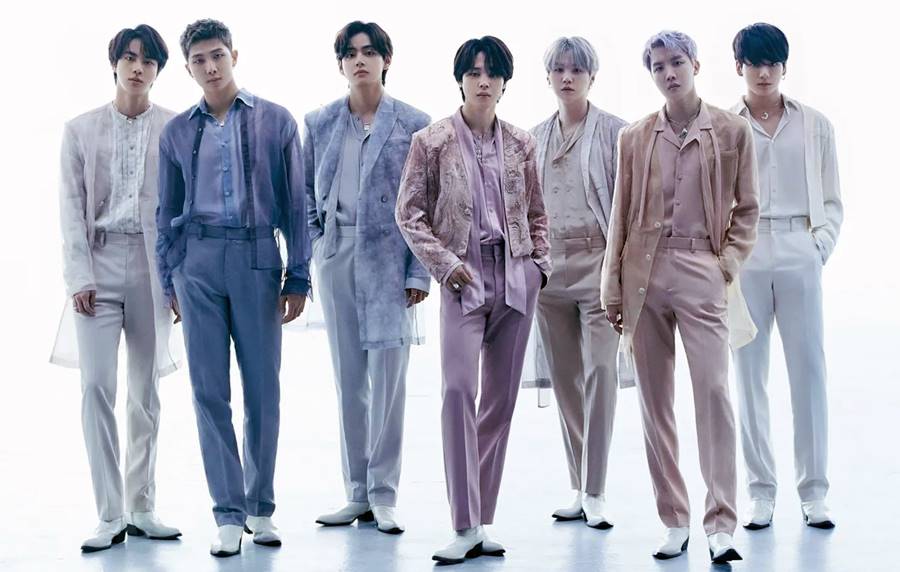
By Jae-Ha Kim
Teen Vogue
June 13, 2023
In this essay, writer Jae-Ha Kim celebrates BTS’s 10th anniversary as a group by looking at the dreams they achieved on behalf of the Korean diaspora.
As BTS celebrates their 10th anniversary, I’m not going to list all their accomplishments. To do so would take up most of this space. Suffice it to say that while critics and fandoms can argue about the artistic merits of other groups, it’s undeniable that what this Korean septet has accomplished is unparalleled. In less than a decade, BTS went from being an unknown group to one of the most famous bands in the world.
While South Korea is rightfully proud of BTS — illuminating landmarks, skyscrapers, and bridges along the Han River in beautiful shades of the group’s favored color purple — millions of fans worldwide are celebrating BTS’s 10-year career, too.
But for the Korean and Asian diaspora, particularly adoptees who were removed from their birth cultures and raised in non-Asian households, BTS’s success has provided a gateway to their heritage — something many transracial adoptees have told me wasn’t ingrained in their formative years.
After BTS catapulted into the stratosphere of superstars in mid 2017, I started receiving hundreds of emails and messages from predominantly new BTS fans who shared their personal epiphanies. The majority were written by Korean adoptees who had been raised “white.” They had never eaten kimchi, could no longer speak Korean, and grew up in towns where they were the only (or one of the few) minorities in their schools. No one instilled Korean culture in their daily lives. Then these adoptees found BTS.
Most had little to no knowledge about Korea or Korean entertainment prior to BTS. They had seen the group on the American Music Awards or Saturday Night Live or The Late Late Show with James Corden, did some YouTube searches, and were charmed by their wit, humor, and talent. This Korean group has always been adamant about the importance of self love and care.
In 2018 Suga told BTS’s fandom, ARMY, “Don’t lose any weight. You are perfect just the way you are.” Meanwhile, RM spoke to the symbiotic relationship BTS has with ARMY in his iconic 2018 U.N. speech: “We started to hear remarkable stories from our fans all over the world how our message helped them overcome their hardships in life and start loving themselves. Those stories constantly remind us of our responsibility.” And in 2020, Jimin reminded fans that they are never alone, because “there is a person here in Korea, in the city of Seoul, who understands you.” One could argue these are merely glib platitudes that don’t mean anything. But these messages of acceptance align with the group’s songs about embracing individuality and, just as importantly, bucking the expectations that society has set for young people. BTS views themselves as flawed human beings who are continuously learning more about themselves and the world they live in. They’re not going to judge their fans for doing the same.
One Korean adoptee sent me a lengthy email to share how BTS helped her realize what had been missing from her life — that part of her identity that she knew nothing about. She wrote, “I really had no idea what being Korean even meant. But when I saw BTS perform on the American Music Awards, it finally hit me and I teared up. I realized that I had been ignoring this part of me for too long. I felt guilty, sad, moved and happy. How ironic was it to finally see my roots so widely embraced by American culture, before I had embraced it myself?”
Later, she excitedly wrote me an update; she was planning her first trip back to South Korea and said that BTS played a big role in this decision — not because she wanted to meet the group, but because they had given her the courage and desire to seek out her birth culture.
When BTS released their debut album 2 Cool 4 Skool on June 12, 2013, I never imagined that this boy band would become international sensations. To be honest, I didn’t know that they would be able to survive this cut-throat music world. In retrospect, it’s clear that they had a plan from the beginning. Their music isn’t a haphazard collection of songs meant to be heard and forgotten. Rather, they set the framework for what was yet to come.
On a personal level, I never thought there would be someone of BTS’ magnitude in my lifetime that would make this kind of worldwide impact. Even college-age me never imagined that a Korean group would headline sold-out stadium concerts around the world. Of course talented Korean and Asian artists existed back then, but no one in our new homelands cared about them. Did we think countries outside of Asia would embrace any of them? No. Why would we, when we witnessed the dismissive attitudes Westerners had for Asians in general.
For many of us, BTS is literally a dream come true. Their 10th anniversary celebration is ours to celebrate, too, because their success is a testament of truth and survival. And it gives us hope.
It was never BTS’s job to fill a void for those of us who grew up without seeing ourselves represented in pop culture. But by being so good at what they do that they couldn’t be ignored, they rose to the top and took us with them.






One thought on “As BTS Celebrates 10th Anniversary, Their Impact and Legacy Is Undeniable”